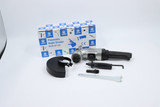Rechargeable Light Bulbs: A Complete Guide to Energy Efficiency and Cost Savings
In an era where sustainability and energy efficiency are paramount, rechargeable light bulbs have emerged as a practical solution for homeowners and businesses alike. These innovative lighting solutions not only help reduce energy consumption but also offer convenience and significant cost savings in the long run. This comprehensive guide delves into everything you need to know about rechargeable light bulbs, from how they work to the best options available in the market.
Understanding Rechargeable Light Bulbs
Rechargeable light bulbs are designed to provide illumination even during power outages. They come with built-in batteries that can be recharged using a standard electrical outlet. Here's a closer look at how they work and their benefits:
How Do Rechargeable Light Bulbs Work?
- Built-in Battery: These bulbs contain a rechargeable battery that stores energy when connected to a power source.
- Automatic Switching: During a power outage, the battery automatically powers the bulb, providing continuous light.
- Recharging: When power is restored, the bulb switches back to mains electricity and recharges its battery.
Benefits of Rechargeable Light Bulbs
- Energy Efficiency: They consume less power than traditional bulbs, leading to lower electricity bills.
- Environmental Impact: Reduced energy consumption means fewer carbon emissions, contributing to a greener planet.
- Convenience: They provide light during power outages, ensuring safety and security in your home or office.
- Cost Savings: Long-term savings are achieved due to lower energy consumption and reduced need for replacements.
- Versatility: Many rechargeable bulbs offer multiple color temperatures and dimming options for customized lighting.
Top Rechargeable Light Bulbs in the Market
When choosing the best rechargeable light bulbs, several factors come into play, including brightness, battery life, and durability. Here are some top options available:
- Safelumin SA19-800G27
- Brightness: 800 lumens
- Color Temperature: 2700K (Soft White)
- Battery Life: Up to 3 hours
- Key Feature: Automatic operation during power outages
- GE Lighting LED+ Color Changing Floodlight Bulbs
- Brightness: 1300 lumens
- Color Options: 9 colors including warm white
- Key Feature: Remote control for easy color and brightness adjustment
- Suck UK Cordless Light Bulb
- Design: Vintage filament style
- Battery Life: Approximately 4 hours
- Key Feature: Portable and can be used anywhere without a fixture
- Neporal MagicGlow Rechargeable Light Bulbs with Remote
- Multiple Color Temperatures: Warm white, cool white, and daylight
- Dimmable: Yes, with remote control
- Key Feature: Adjustable ambiance for different needs
- Flyhoom USB Rechargeable LED Light Bulbs with Remote
- Brightness: 180-600 lumens (varies by model)
- Multiple Lighting Modes: High, medium, low, and SOS strobe
- Key Feature: Portable design with built-in hook for hanging
- Maxxeon WorkStar 3001
- Brightness: Up to 1000 lumens
- Multiple Lighting Modes: High, medium, low, and top torch
- Key Feature: Professional-grade durability with flexible positioning
How to Choose the Best Rechargeable Light Bulbs
Selecting the right rechargeable light bulb involves considering several important factors:
- Brightness (Lumens):
- Higher lumens mean brighter light
- Choose based on the area you want to illuminate
- Typical range: 450-1600 lumens for general home use
- Battery Life:
- Look for bulbs with longer battery life to ensure they last through power outages
- Most quality bulbs offer 3-5 hours of battery-powered illumination
- Compatibility:
- Ensure the bulb fits standard sockets and fixtures in your home (e.g., E26/E27 for most US households)
- Energy Efficiency:
- Check for Energy Star ratings and other indicators of efficiency
- LED technology is generally the most energy-efficient option
- Color Temperature:
- Measured in Kelvin (K)
- Soft white (2700-3000K) for cozy, warm light
- Cool white (3500-4100K) for a balanced, neutral light
- Daylight (5000-6500K) for bright, energizing light
- Additional Features:
- Smart connectivity (Wi-Fi, Bluetooth)
- Dimming capabilities
- Remote control operation
- Color-changing options
- Brand Reputation and Warranty:
- Choose reputable brands known for quality and reliability
- Check warranty terms for peace of mind
Maintenance Tips for Rechargeable Light Bulbs
To maximize the lifespan and efficiency of your rechargeable light bulbs, follow these maintenance tips:
- Regular Use:
- Use the bulbs regularly to ensure the battery stays active and functional
- Avoid leaving them unused for extended periods
- Proper Charging:
- Follow manufacturer guidelines for charging the bulbs
- Avoid overcharging, which can damage the battery
- Clean the Bulbs:
- Keep the bulbs clean and dust-free to maintain optimal brightness
- Use a soft, dry cloth to gently wipe the surface
- Check Battery Health:
- Periodically check the battery's performance
- Replace the bulb if you notice a significant drop in battery life or brightness
- Avoid Extreme Temperatures:
- Keep bulbs away from excessive heat or cold, which can affect battery performance
- Store Properly:
- If not in use for long periods, store in a cool, dry place
- Charge partially before storage to maintain battery health
Energy Efficiency and Cost Savings
Rechargeable light bulbs offer significant energy efficiency and cost savings compared to traditional lighting options. Here's a breakdown of the potential benefits:
Energy Consumption Comparison
| Bulb Type | Wattage | Annual Energy Use* | Annual Energy Cost** |
| Incandescent | 60W | 526 kWh | $63.12 |
| CFL | 14W | 123 kWh | $14.76 |
| LED | 9W | 79 kWh | $9.48 |
| Rechargeable LED | 9W | 75 kWh | $9.00 |
*Assuming 8 hours of use per day **Based on average electricity rate of $0.12 per kWh
As you can see, rechargeable LED bulbs offer the lowest energy consumption and cost, providing significant savings over time.
Long-Term Cost Savings
While rechargeable light bulbs may have a higher upfront cost, they offer substantial savings over their lifetime:
- Longer Lifespan: Rechargeable LED bulbs can last up to 25,000 hours or more, compared to 1,000 hours for incandescent bulbs.
- Lower Energy Bills: As shown in the table above, rechargeable LEDs use significantly less energy, resulting in lower electricity costs.
- Reduced Replacement Costs: With their long lifespan, you'll need to replace rechargeable bulbs less frequently, saving on replacement costs.
Environmental Impact
By choosing rechargeable light bulbs, you're also making an environmentally friendly choice:
- Reduced Energy Consumption: Lower energy use means fewer greenhouse gas emissions from power plants.
- Less Waste: Longer lifespan results in fewer bulbs ending up in landfills.
- Battery Recycling: Many rechargeable bulbs have recyclable batteries, further reducing environmental impact.
Related Articles
To further expand your knowledge on rechargeable light bulbs and related topics, check out these informative articles:
- How Do Rechargeable Light Bulbs Work? A Technical Overview This article provides an in-depth look at the technology behind rechargeable light bulbs, explaining their internal components and functioning. It's perfect for those who want to understand the technical aspects of these energy-efficient lighting solutions.
- How Long Do Rechargeable Light Bulbs Last: A Comprehensive Guide Discover the factors that influence the lifespan of rechargeable light bulbs, including battery life, LED durability, and usage patterns. This guide helps you understand what to expect from your investment in rechargeable lighting.
- Exploring the Pros and Cons of Rechargeable Light Bulbs This balanced article discusses both the advantages and potential drawbacks of rechargeable light bulbs. It's an excellent resource for those weighing the decision to switch to rechargeable lighting options.
- Rechargeable Light Bulbs: Advantages and Limitations Delve deeper into the benefits and potential limitations of rechargeable light bulbs. This article provides a comprehensive overview to help you make an informed decision about incorporating these bulbs into your lighting setup.
- The Ultimate Guide to Rechargeable Light Bulbs This comprehensive guide covers everything from the basics of rechargeable light bulbs to advanced topics, including choosing the right bulb for your needs, maintenance tips, and future trends in rechargeable lighting technology.
These articles complement the information provided in this guide and offer additional insights into various aspects of rechargeable light bulbs. Whether you're a curious homeowner or a lighting enthusiast, these resources will help you gain a well-rounded understanding of rechargeable lighting solutions.
Frequently Asked Questions (FAQs)
Do rechargeable light bulbs really work?
Yes, rechargeable light bulbs are effective and reliable. They function as regular LED bulbs when connected to power and automatically switch to battery power during outages, providing continuous illumination.
Does a rechargeable bulb consume more electricity?
No, rechargeable bulbs typically consume the same or less electricity than standard LED bulbs. The slight additional power used for charging the battery is negligible compared to the overall energy savings.
What are the disadvantages of rechargeable lights?
The main disadvantages include higher upfront costs, potential for battery degradation over time, and slightly heavier weight compared to standard bulbs. However, these are often outweighed by the long-term benefits.
What are the best light bulbs to lower electric bills?
LED bulbs, including rechargeable LED bulbs, are the most energy-efficient options for lowering electric bills. They use significantly less energy than incandescent or CFL bulbs while providing the same level of brightness.
Does a rechargeable bulb charge when the switch is off?
It depends on the specific bulb design. Some rechargeable bulbs continue to charge when the switch is off, while others require the switch to be on for charging. Check the manufacturer's specifications for your particular bulb.
How long do rechargeable light bulbs last?
The LED component of rechargeable light bulbs can last up to 25,000 hours or more. The rechargeable battery typically lasts for 3-5 years with proper use and maintenance. Overall lifespan can vary depending on usage patterns and quality of the bulb.
Conclusion
Rechargeable light bulbs represent a significant advancement in lighting technology, offering a perfect blend of energy efficiency, convenience, and cost savings. By understanding how these bulbs work and considering the factors outlined in this guide, you can decide when upgrading your home or office lighting.
The benefits of rechargeable light bulbs extend beyond just energy savings. They provide peace of mind during power outages, contribute to a more sustainable lifestyle, and offer versatile lighting options to suit your needs. As technology advances, we can expect even more innovative features and improvements in rechargeable lighting solutions.
Call to Action
Ready to upgrade your lighting and start saving on energy costs? Explore our range of high-quality rechargeable light bulbs at Tend Industrial Supplies. Visittendsupplies.com to browse our selection and find the perfect rechargeable bulbs for your home or office. Our knowledgeable team is always available to answer your questions and help you make the best choice for your lighting needs. Make the switch to energy-efficient, cost-effective lighting today!
For more information or personalized assistance, don't hesitate to contact us at sales@tendsupplies.com. Let Tend Industrial Supplies help you achieve a brighter, more energy-efficient future.









